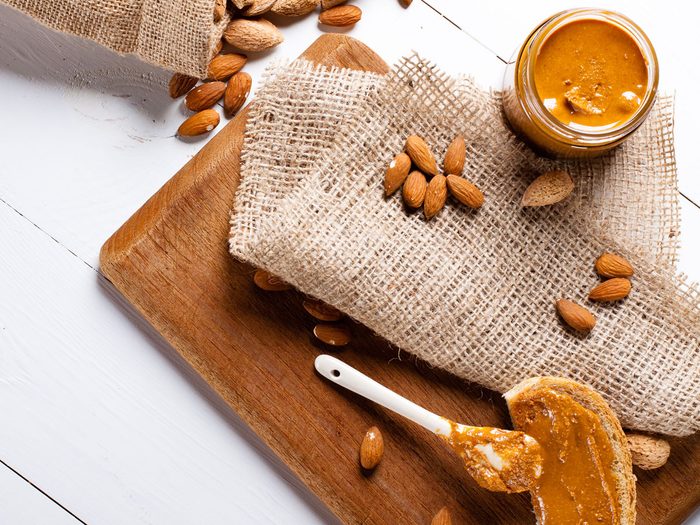
Almond Butter
Compared to peanut butter, almond butter has about the same amount of protein per two tablespoons—approximately 7 grams—while also packing seven times more calcium, as well as 50 percent more magnesium. It also has a higher level of monounsaturated fats, which can lower your LDL cholesterol levels.
Taste: Mild and creamy, and very easy to spread.
Uses: This butter works great as a schmear, or as a substitute for butter or oil in baked goods. You can also add it to smoothies and soups for a thicker consistency. But if you love snacks, check out our grab-and-go almond butter energy bites recipe.
Try: Nuts To you Almond Butter, $12, houseofwellness.ca
(Related: Is Almond Butter Actually Healthy for You?)
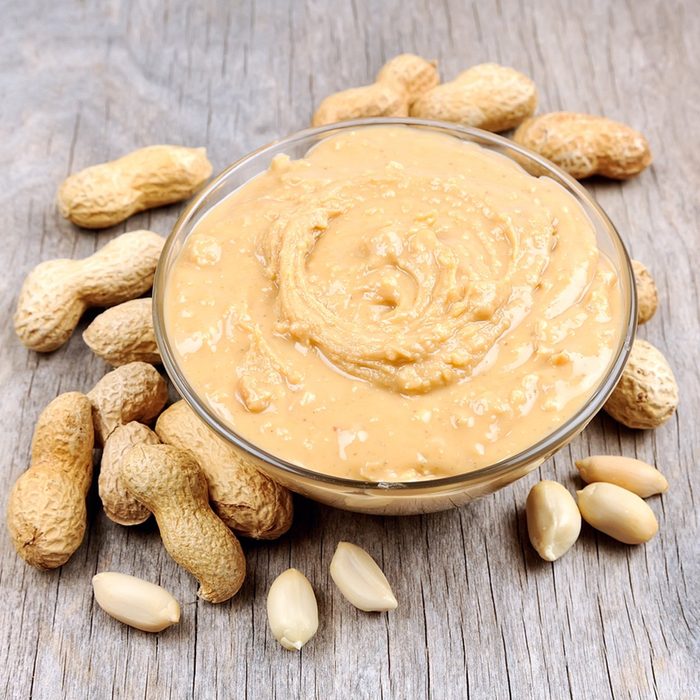
Peanut Butter
Of course, no roundup of the best healthy nut butters would be complete without a nod to peanut butter. PB is a favourite among athletes and nutritionists, and for good reason—it’s got plenty of protein, and is high in polysaturated and monounsaturated fats for regulating your cholesterol.
Taste: Creamy, rich, classic.
Uses: Use peanut butter as a spread or a dip for fruits and vegetables. It’s also a great substitute for tahini in a hummus recipe, and will add a delicious boost to oatmeal, smoothies and baked goods. Plus, these Banana Peanut Butter Granola Bars will fuel you all morning long.
Try: Fatso Peanut Butter Classic, $10, houseofwellness.ca
(Related: Almond Butter vs. Peanut Butter—Which is Healthier?)
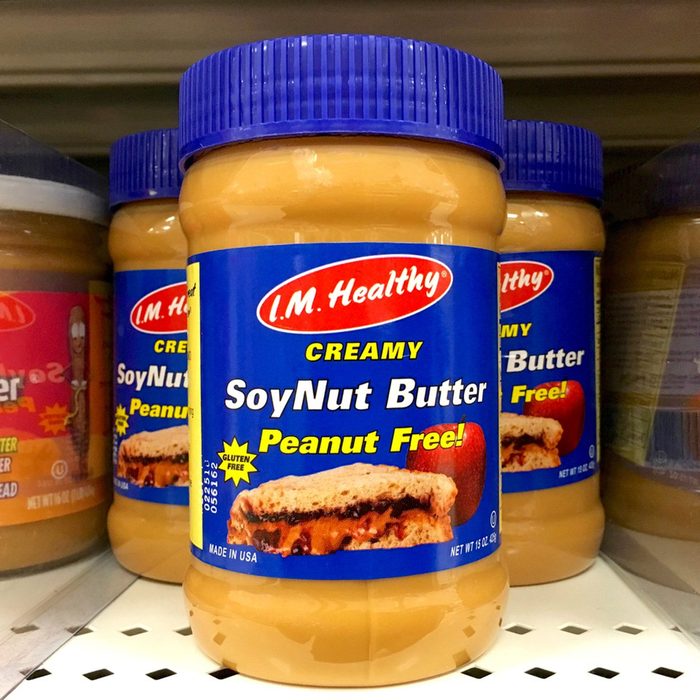
Soy Nut Butter
With peanut allergies on the rise, it’s important to have some good peanut and tree nut substitutes on hand. Soy nut butter is made from roasted soybeans, and it doesn’t contain gluten or dairy. Sitting only a little lower on the protein scale—6.6 grams of protein per two tablespoons compared to 7 grams in peanut butter—soy nut butter also has all essential amino acids, and a good serving of those healthy unsaturated fats.
Taste: Creamy and savoury, with less of a strong nutty flavour than other nut butters.
Uses: Swap for peanut butter to make recipes peanut-free.
Try: Make it at home with this 4-ingredient recipe.
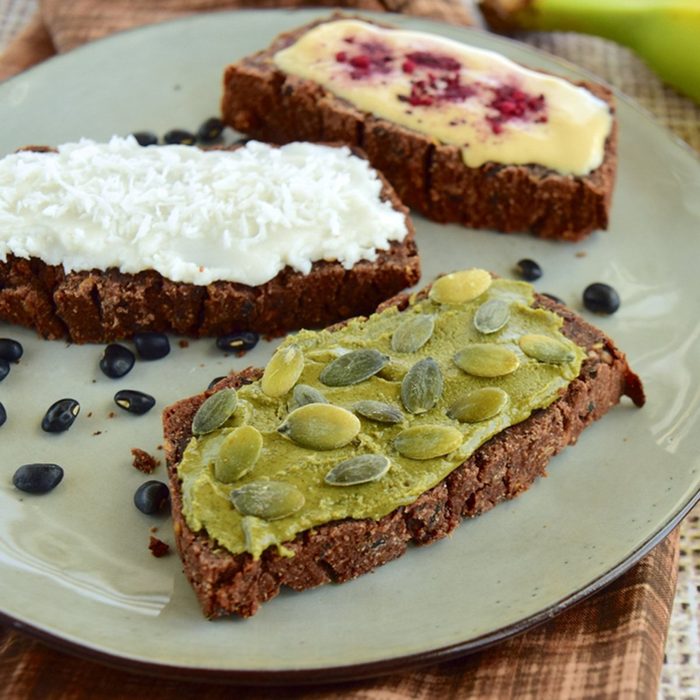
Pumpkin Seed Butter
Pumpkin seed butter is actually made from pepitas, not the large white seeds from your Halloween pumpkin. The butter is higher in protein per 200 calorie serving than most other nut butters. Plus, pumpkin seed butter naturally contains lots of zinc, which is great for your immune system.
Taste: Very nutty and earthy. It’s super-easy to spread, and it doesn’t need stirring unlike many nut butters.
Uses: Mix with honey to balance out the flavour, and use as a spread or substitute for peanut butter in recipes.
Try: Nuts To you Pumpkin Seed Butter, $8, houseofwellness.ca
(Related: Should You Try Seed Cycling to Improve Your Menstrual Cycle?)
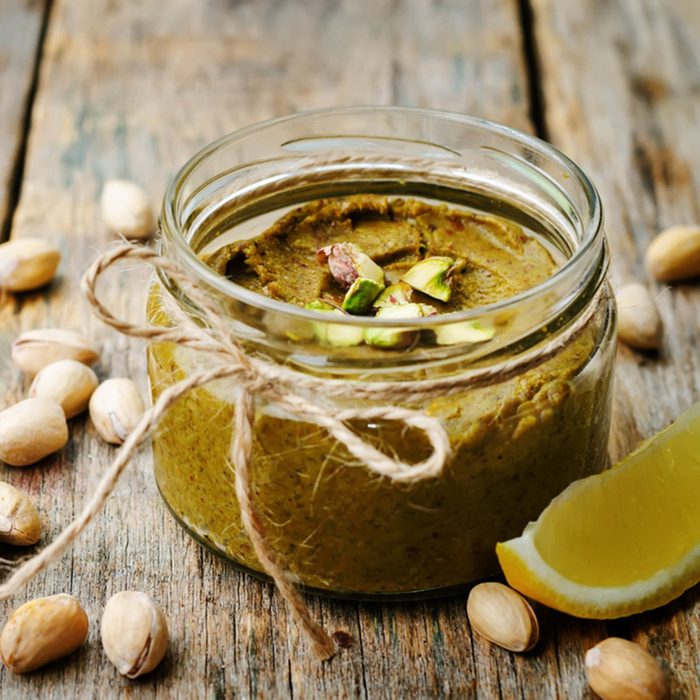
Pistachio Butter
Pistachio butter is much lower in fat than other nut butters—only 13 grams per two tablespoons compared to almost 18 grams in almond butter—but still has 6 grams of protein. It’s also totally cholesterol-free and has lots of potassium and fibre, as well as copper for building strong bones and connective tissue.
Taste: Herbal, earthy and bitter.
Uses: Blend with cheeses and creams for a dip or spread, use as a base for your favourite desserts.
Try: Ecoideas Organic Pistachio Butter, $19, well.ca
(Related: Are Pistachios Good for You? Their Nutrition, Calories, and Health Benefits)
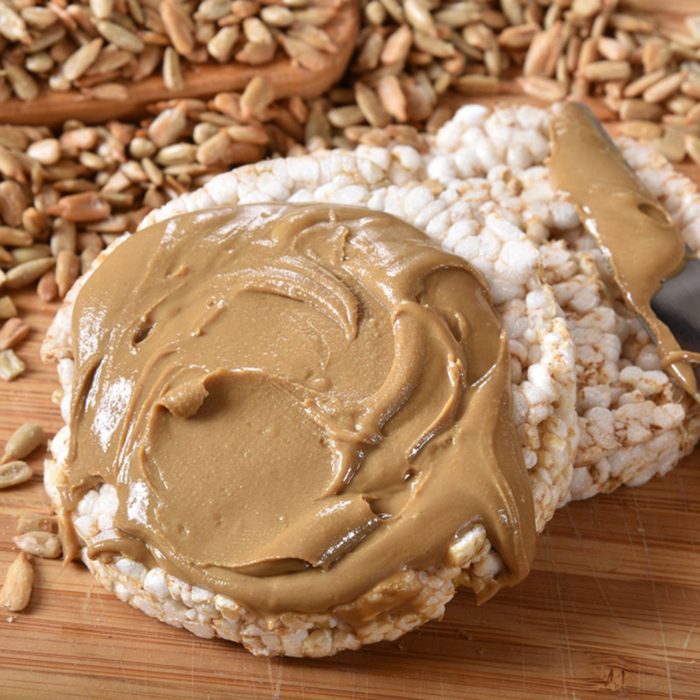
Sunflower Seed Butter
Another great alternative for those with peanut or tree nut allergies, sunflower seed butter has more fibre, magnesium, vitamin E, zinc and copper than most other nut butters. It also has a good dose of selenium, which can help reduce cholesterol.
Taste: Sunflower seed butter is definitely an acquired taste—its flavour profile is, well, very much like a mouthful of sunflower seeds. It’s earthy, with a big, bold flavour.
Uses: Use sunflower seed butter in your favourite salad dressings and vegetable sauces.
Try: Nuts to You Smooth Sunflower Seed Butter, $7, well.ca
(Related: Why Sunflower Seed Butter Needs to Be Part of Your Diet)
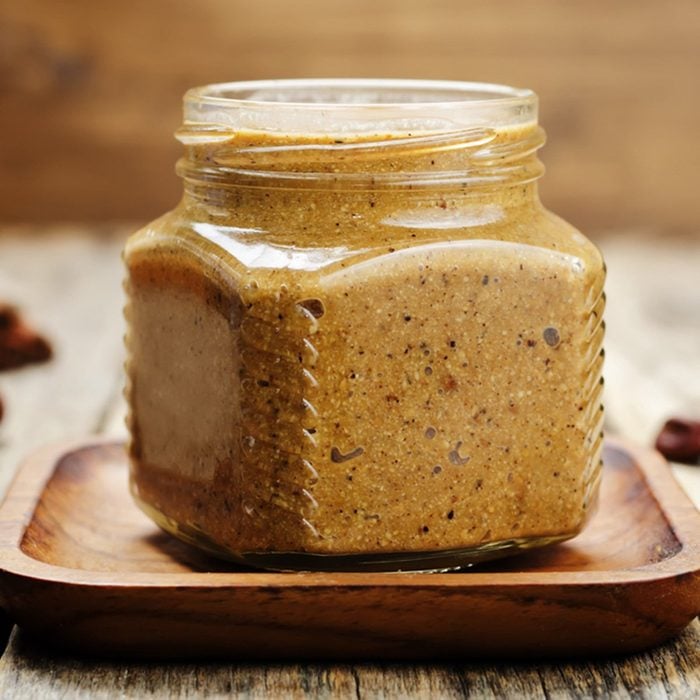
Hazelnut Butter
Hazelnuts have lots of protein, fibre, vitamin E, manganese and copper. While Nutella popularized this nut butter, you’re better off saving that chocolatey spread for a sweet treat and opting for the pure hazelnut butter for daily eating.
Taste: Rich and nutty.
Uses: Hazelnut butter is delicious in baked goods, or just as a plain ol’ spread.
Try: Nuts To You Smooth Hazelnut Butter, $15, well.ca
(Related: Are Hazelnuts Healthy? Here’s What Nutritionists Say)
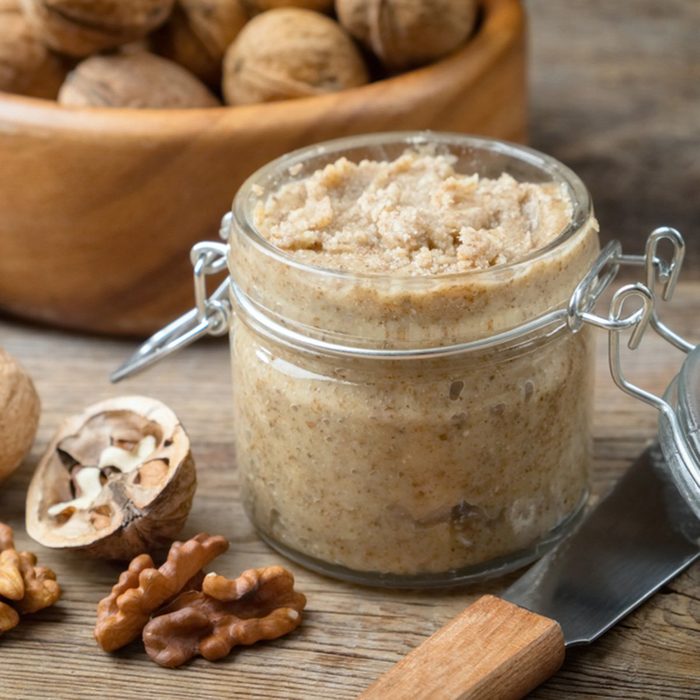
Walnut Butter
While not the highest in protein, walnuts do have super-high levels of omega-3 fatty acids, and they also have anti-inflammatory properties which is great for people suffering from arthritis and autoimmune diseases.
Taste: Earthy and buttery, with a strong tannic, bitter flavour. Walnut butter is thick and a little drier, so it can be difficult to use as a spread by itself.
Uses: Pair with sweet flavours, like chocolate or cinnamon, to balance out the strong taste. It’s a great binding agent, so use it to firm up your veggie burgers and add a nice, nutty texture.
Try: Make walnut butter at home with this simple recipe.
(Related: Are Walnuts Good for You? Their Calories, Nutrition, and Benefits)
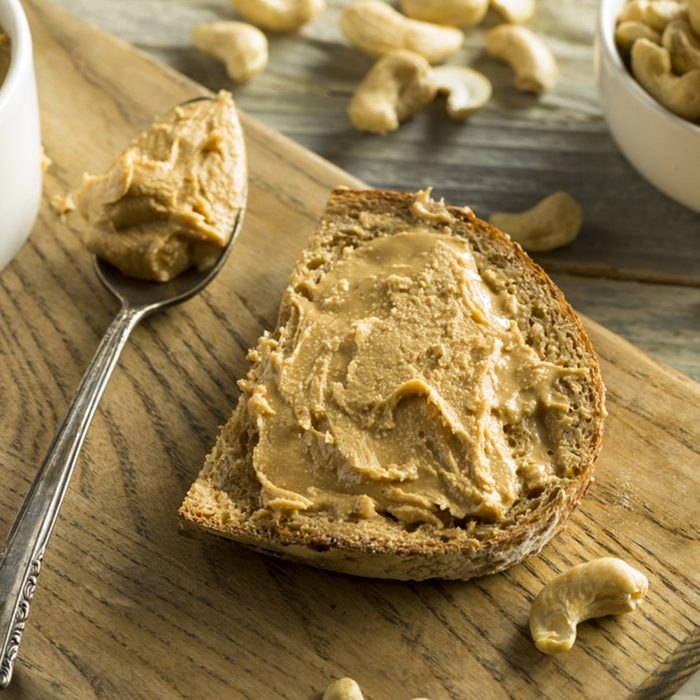
Cashew Butter
Cashew butter is full of monounsaturated fat to keep your bad cholesterol levels down, and it also has over 80 percent of the daily recommended dose of copper. While cashew butter is lower in calcium than other nut butters, it does contain lots of magnesium and oleic acid for a healthy heart, as well as biotin for strong hair, skin and nails.
Taste: Rich cashew taste and smell, but overall it’s pretty light and sweet. It also has a thin consistency that makes it easy to spread.
Uses: Cashew butter is a great ingredient for sauces and curries, as well as a vegan alternative for cream cheese and sour cream.
Try: Nuts To you Cashew Butter Smooth Organic, $16, houseofwellness.ca
(Related: How to Make Cashew Milk)
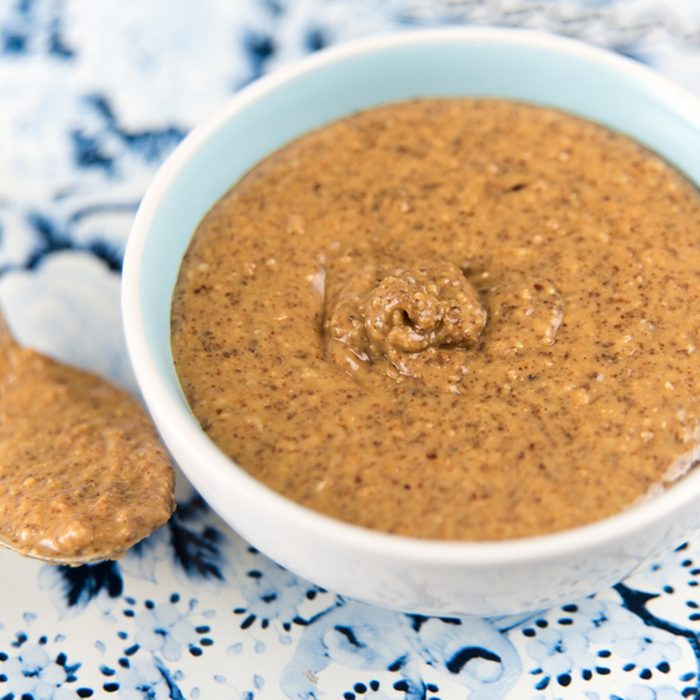
Brazil Nut Butter
People rave about Brazil nuts because of their high selenium content.
Taste: Rich and creamy, very similar flavour to coconut.
Uses: This works great as a vegetable dip or a spread. It’s also very easy to make at home because its high fat content requires less processing to get it into butter form.
Try: Dastony Organic Brazil Nut Butter, $16, iherb.com
(Related: Are Brazil Nuts Good for You? Here’s What Nutritionists Say)
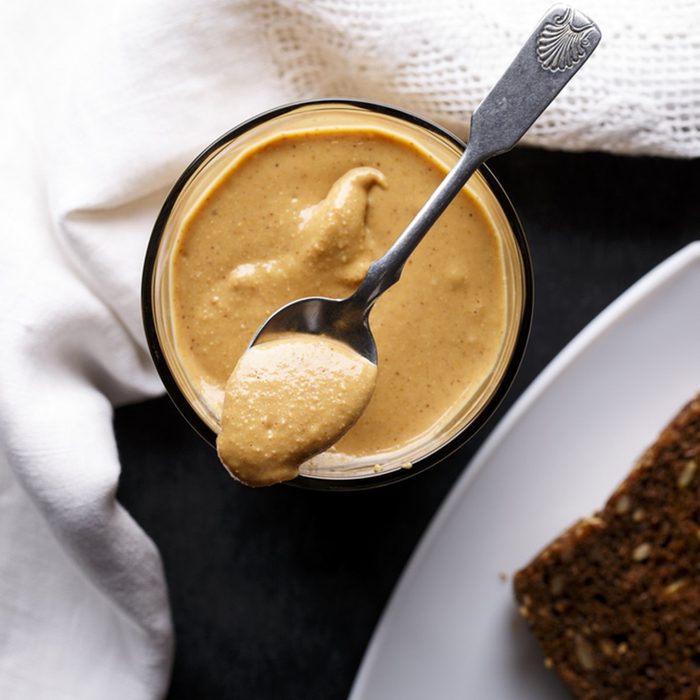
Macadamia Butter
This luxurious butter is very high in unsaturated fats, but lower in protein than other nut butters—only 4 grams per two tablespoons.
Taste: Floral, buttery and tropical.
Uses: Use instead of butter for a delicious spread, or pair with sweeter cheeses and fruit. It can also be used in smoothie bowls as a creamy, rich topping.
Try: Wilderness Poets Raw Macadamia Butter, $23, iherb.com
(Related: Are Macadamia Nuts Good for You?)
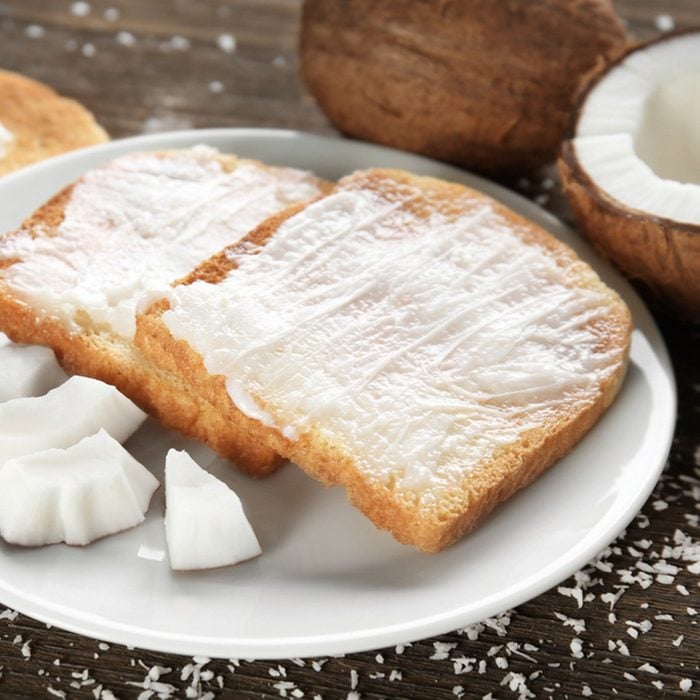
Coconut Butter
Unlike coconut oil, coconut butter is made from the flesh of the coconut. It has tons of lauric acid, which is great for energy production and for keeping your cholesterol levels in check. However, its high fat content is mostly composed of saturated fats, and its calorie count is the highest of the nut butters.
Taste: Creamy and tropical, with a mild flavour.
Uses: Swap coconut butter for butter in any recipe for a more healthful, vegan alternative.
Try: Nutiva Coconut Manna, $13, well.ca or make it at home with our recipe.
